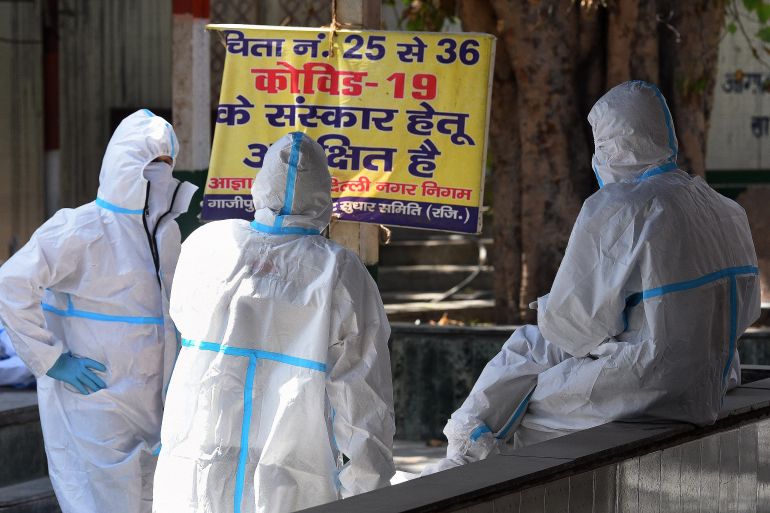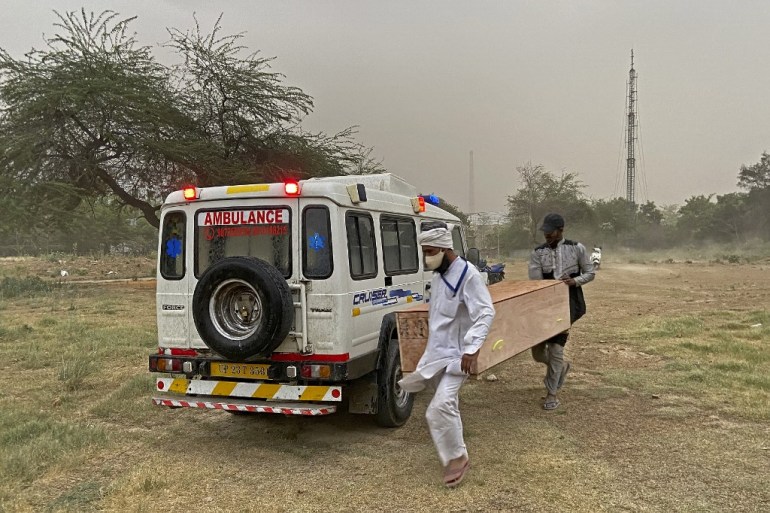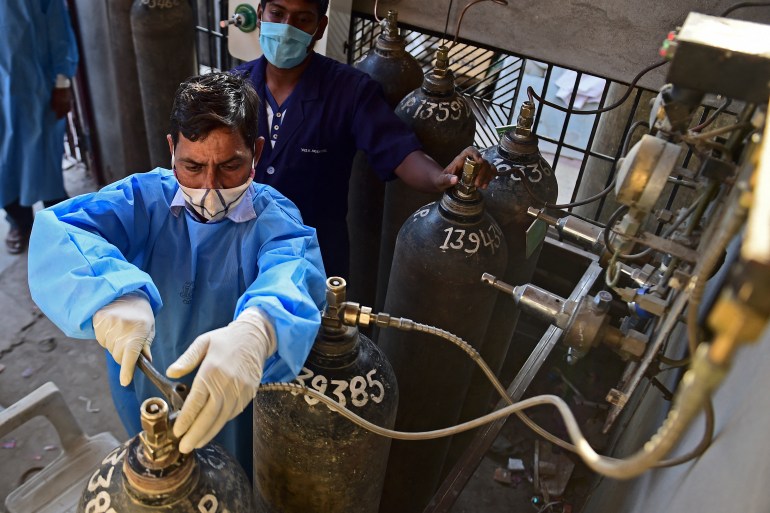New record rise in India’s COVID cases, deaths; curfew in capital
India reports 273,810 new cases, taking its overall caseload past 15 million and a record 1,619 deaths as Delhi announces six-day curfew.

India has reported a record rise in coronavirus infections of 273,810, as capital New Delhi announces a complete curfew starting Monday night and hospitals across the country struggle with a shortage of hospital beds and oxygen supplies.
The country’s deaths from COVID-19 rose by a record 1,619 to reach a total of 178,769, according to health ministry data on Monday.
Keep reading
list of 4 itemsOxygen shortage in India’s Maharashtra as COVID cases soar
India: Vaccine exclusion fears over digital ID, face recognition
India’s COVID vaccine maker urges Biden to lift exports embargo
India has the fourth highest number of deaths after the United States, Brazil and Mexico – though, with nearly 1.4 billion people, it has a much larger population than those countries. India’s overall coronavirus caseload is now past 15 million, second only to the US globally.
Lockdown in Delhi
The Indian capital will be under a strict lockdown for six days starting on Monday night, Delhi state’s Chief Minister Arvind Kejriwal said, adding the healthcare system was at a breaking point because of the worsening COVID-19 outbreak.
“If we don’t impose a lockdown now, we will be looking at a bigger disaster. From tonight there will be a lockdown until next Monday,” Kejriwal said.
“I do not say that the system has collapsed, but it has reached its limits,” he said, adding that harsh measures were necessary to “prevent a collapse of the health system”.
Several major market associations in the city, which is among the country’s worst hit, have announced that they will keep their markets closed till April 25.
According to India’s health ministry, Delhi reported 25,462 cases and 161 deaths in the past 24 hours.

Kejriwal also said the capital was also facing acute shortages of hospital beds and key medicines such as the anti-viral remdesivir.
“The cases are rising very fast… only 100 beds left,” Kejriwal said on Sunday in a video statement, adding that additional beds would be set up at some schools and a sport complex.
He later tweeted that there was an “acute shortage of oxygen”, adding in capital letters that “oxygen has become an emergency” in the megalopolis.
Chief Minister Arvind Kejriwal appeals to migrant workers not to leave Delhi during 'small lockdown'
— Press Trust of India (@PTI_News) April 19, 2021
Indian social media was flooded with people complaining about the lack of beds, oxygen cylinders and drugs, and citizen groups circulating helpline numbers and volunteering support.
Politicians hold mass rallies
Despite soaring infections, politicians continued to hold mass rallies across the country for state elections.
Criticism has mounted over how Prime Minister Narendra Modi’s administration has handled India’s second wave of the pandemic, with religious festivals and election rallies being attended by thousands.
Bharatiya Janata Party (BJP) national president JP Nadda holds a roadshow in North Dinajpur, ahead of the 6th phase of Assembly polls#WestBengalElections pic.twitter.com/d6GOtZhq6C
— ANI (@ANI) April 19, 2021
Leaders including Home Minister Amit Shah are set to hold further road shows and public meetings on Monday.
Congress leader Rahul Gandhi – who has also addressed election rallies in recent weeks – said on Sunday he was suspending all his public rallies in West Bengal state, which is in the middle of polls.
Indian media reports said Modi will chair an “important meeting” on Monday on “COVID-related situation” as Maharashtra’s ruling Shiv Sena party demanded a special session of India’s Parliament to discuss the coronavirus crisis.

India’s soaring cases and deaths come just months after India thought it had seen the worst of the pandemic, but experts say even these figures are likely an undercount.
Virus curbs have also been imposed in Maharashtra, home to India’s financial capital, Mumbai. The closure of most industries, businesses and public places imposed on Wednesday night is to last 15 days.
The Delhi government meanwhile said millions of pilgrims who attended an ongoing Hindu festival, the Kumbh Mela, had to quarantine for two weeks if they returned to the city.
Nearly 3,700 people have tested positive in the past week in the city of Haridwar, which lies along the Ganges river where the Kumbh Mela festival is being observed, the Uttarakhand state government said.
Health experts have warned the pilgrimage could become a “super-spreader” event.